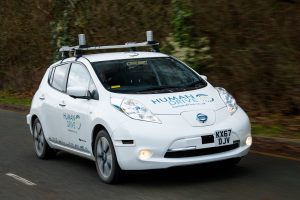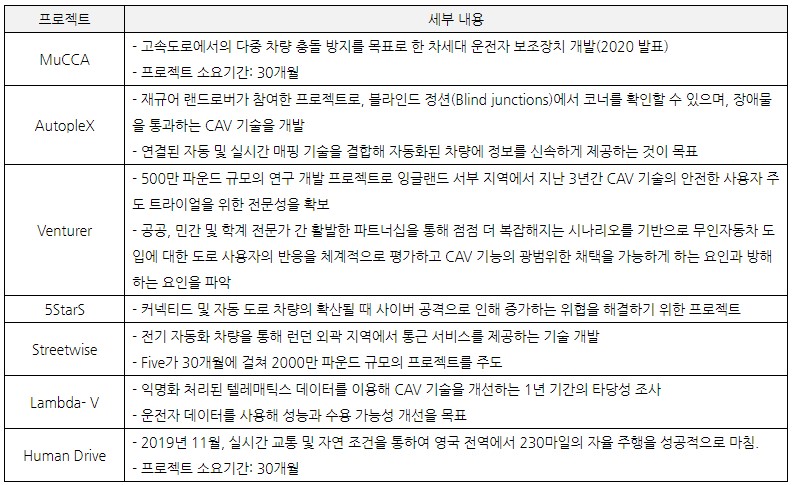2021-08-11 Park Ji-hye, London Trade Center, UK
– UK to allow ALKS technology vehicles from the end of 2021 –
– UK government continues to invest in connected and autonomous vehicle trials –
UK Government's Adoption of Self-Driving Vehicles
The British government plans to allow self-driving vehicles on UK roads from the end of 2021. The UK Department of Transport said in April that it was working to update the national Highway Code to ensure safe use of Automated Lane Keeping Systems (ALKS), which use sensors and software to keep vehicles within their lanes.
If all goes as planned, when a vehicle equipped with ALKS technology receives GB vehicle type approval and the vehicle is recognized as having autonomous driving capability, it can be legally defined as autonomous driving. ALKS is designed for use on low-traffic highways and has the ability to easily and safely return control to the driver while allowing the vehicle to drive itself in a single lane. The driver can hand over control of the vehicle so that the vehicle continuously monitors speed and maintains a safe distance. Use of the ALKS is limited to 37 mph (60 km).
According to the UK Department of Transport, ALKS can improve road safety by reducing human error, which accounts for 85% of road accidents. The UK government is focused on being at the forefront of adoption of autonomous driving technology and aims to have around 2035% of new UK vehicles equipped with autonomous driving capabilities by 40. The industry predicts that connected autonomous vehicle technology will bring the UK economy a value of £2035 billion by 420 and create around 3 new jobs.
Industry reaction
The automotive industry is welcoming the UK government's goal of introducing autonomous vehicles as an important step toward allowing the use of autonomous vehicles. The UK government's move will make the UK a pioneer in road safety and automotive technology. Autonomous driving systems can reduce human error, the single largest cause of traffic accidents, and thereby prevent 10 serious accidents and save 4 lives over the next 7000 years.
British Automobile Manufacturers Association (SMMT) President Mike Hawes said technologies such as ALKS will pave the way for higher levels of autonomy in the future, and these advances will enable the UK to become a world leader in the development and use of autonomous driving technology. He said he would unleash his potential. It will also create essential jobs while ensuring safe roads.
Meanwhile, insurance companies warn that Britain's goal of becoming a leader in autonomous vehicle adoption could backfire unless automakers and regulators account for the limitations of the technology that can be used today. Since ALKS still relies on the driver for driving control, the term autonomous driving can lead to misunderstandings about the performance of the vehicle by consumers. Thatcham Research's M, in an interview with KOTRA's London trade office, warned that ALKS should not be described as autonomous as it still relies on driver control. He said that the confusion and misuse of assistive driving systems, which have already caused many accidents, should be avoided.
UK autonomous driving technology
A number of UK companies are developing next-generation autonomous vehicles. It is pursuing the development of core enabling technologies for connected and autonomous vehicles (CAV), such as artificial intelligence, cybersecurity and software, from various angles. In the UK, since 2015, the Center of Connected and Autonomous Vehicles (CCAV) has been established to develop and disseminate technology. The UK government agency CCAV allocates and manages £2m of funding. CCAV has funded approximately 4 projects over the past four years, including feasibility studies and simulations of CAV tests on the road, and approximately 80 programs are expected to be implemented in 2021.
Key developments include the launch of testbeds such as London's Smart Mobility living Lab and Midlands Future Mobility. Despite the pandemic caused by the corona virus, on-road trials such as HumanDrive and Project Endeavor are also continuing. Continuing to test successful trials on Europe's most complex roads, it can provide the public with experience and insight into autonomous technology and the services it can bring. The on-road trial is providing an important lesson for the UK. Testing also helps to ensure public opinion, particularly safety awareness, and whether services are accessible and inclusive.
CCAV continues to trial various services and solutions that CAV can provide for the future of transportation. The Human Drive project, which ran from July 2017 to March 7, successfully drove the 2020-mile distance from Cranfield to Sunderland in fully autonomous mode for 3% of the journey with Nissan's Leaf electric vehicle. The experience gained from this project will be used by Servciry program partners Nissan, Connected Places Catapult, TRL, Hitachi and the University of Nottingham to transport passengers on London roads in self-driving Leaf vehicles.
[Human Drive Project Photo]

Source: Human Drive website
Oxbotica, meanwhile, is a Project Driven leader and a Partner to Project Endeavor designed to scale and accelerate the deployment of autonomous vehicles. Oxbotica focuses on the following topics:
1. Running 4 trials/demonstrations of AV on public roads across different cities in the UK
2. Working with local authorities to understand the technology and support needed to lay out AV roads
3. Conduct research involving the public to understand attitudes towards AV technology and related services
4. Develop and improve safety assurance methodology
The ongoing trials of connected and autonomous vehicles in the UK offer a way to use roads more efficiently. Especially in recent years, given the importance of delivery of goods and groceries, it has become more urgent. The industry stresses that the trial in 2021 should encourage all local authorities to think about how they fit into the CAV blueprint and plans for sustainability and mobility.
The CAVForth trial, meanwhile, will actually travel 30 miles this year with passengers on autonomous buses. The project, led by Fusion Processing, features five 30-seater buses operating at speeds of up to 50 miles on a 5-mile route between Fife and the Edinburgh Park train and tram interchange. The bus is equipped with Fusion Processing's CAVstar control and sensing system integrated with steering, throttle and brake systems. Along with navigation, it can pull information from radar, lidar, optical cameras and ultrasonic sensors to detect and avoid objects in all weather and light conditions. Buses operate in Level 42 autonomous driving and operate autonomously along the route. There is regular driver control, but they do not plan to take control except in emergency situations.
Academy of Robotics presented Kar-go, a combination of advanced robotics and driverless vehicle technology with the goal of bringing autonomous driving to regional deliveries. Kar-go is known to use a combination of advanced robotics and driverless vehicle technology to eliminate up to 90% of shipping costs. Streamline the process through proprietary intelligent package management built into electric autonomous vehicles.
[Kar-go driving]

Source: Academy of Robotics website
implication
The UK continues to invest and support the development of autonomous driving, which is key to driving future mobility. The UK government is ambitious with its goal of becoming a leader in autonomous vehicle adoption by legalizing autonomous vehicle operation. However, some argue that the UK's goal of becoming a leader in autonomous vehicle adoption could backfire unless automakers and regulators address the limitations of the technology that can be used today.
Insurance company AA argues that vehicle safety technology can save lives, but it shouldn't compete to take drivers off the wheel. There are still gaps in how to detect and stop a vehicle when it collides, and there is still a question mark as to how drivers can fully understand how these systems work. The view therefore exists that more work is needed to rigorously test these systems before they can be used on UK roads.
Nevertheless, the UK industry and academia are in the midst of developing technologies to lead the future of mobility through various projects. They have formed a consortium and are actively working to develop and refine participatory models in collaboration with agencies and local authorities that configure autonomous vehicle software and test vehicles or provide AV simulations. It will take a long time for autonomous driving technology to become common, but the UK industry predicts that AV will be used within 5 years in an industrial environment that is simple and easy to operate. Korean companies considering advancing into the UK need to pay attention to various consortiums that are formed until autonomous driving is established in the UK.
[Main Projects of Connected and Self-Driving Vehicles]

Source: KOTRA’s own data from the London Trade Center
Source: Comprehensive data from the UK government website, local media and KOTRA London Trade Center



